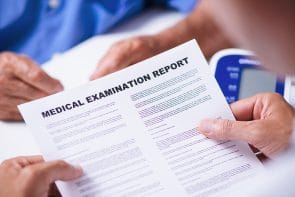What happens at a medical examination in a Personal Injury claim?
A medical examination is a key part of any Personal Injury claim. A professional health expert will provide their own independent opinion on your injuries and any likely causes. The results of this investigation will be included in the final report submitted. It can be time consuming but is a necessary part of building medical evidence to support your claim.
What happens in a medical examination?
Medical exams typically last around 15-20 minutes, depending on your injuries. Before you undergo the exam itself, all your medical records and any other relevant paperwork will need to be submitted to the expert conducting the investigation. A detailed account of the incident, injuries sustained and a request for their professional opinion will be part of this documentation. This may include their prognosis and expected recovery time. The chosen expert will usually review this information before starting the physical exam and will reference relevant documents during their medico legal report.
What is a medico legal report?

A medico legal report is the written professional opinion of an independent expert on the injuries involved in a Personal Injury claim. It will also include recommendations for future treatment if relevant.
Sometimes, the opinion of multiple experts may be required. Depending on the nature of your injuries, the most common experts consulted are:
- Orthopaedic Surgeon
- General Practitioner
- A&E Specialist
- Plastic Surgeon
- Psychiatrist
- ENT Specialist
- Physiotherapist
The doctor or consultant who may have treated your injuries so far, whether at hospital or your GP surgery, will be unable to contribute to the report. This is because they’re seen as the provider of care and recovery treatment.
A medico legal expert provides an additional, independent opinion and prognosis on your injuries and their most likely cause. While they may make recommendations of further treatment and recovery, they would not be involved in delivering it.
What paperwork will be submitted before a medical examination?
If you’re making a Personal Injury claim, you’ll need to submit medical evidence that supports your case. These should detail the cause and extent of your injuries. The claims process will also take any pre-existing conditions or medical history into account as these may relate to the injuries featured in the claim.
Medical evidence you may submit can include:
- Medical history records
- Hospital records
- Operations history
- Physiotherapy treatment history
- Dental records
- History of GP visits
What question will the medical examiner ask?
A medical examiner will often have several questions they have to ask as part of the investigation. These can differ depending on your injuries but typically include:
- What happened before, during and after the accident?
- What treatment did you seek?
- Has this treatment been effective?
- What are your ongoing symptoms?
- How are these affecting you on a daily basis?
- Do you have any pre-existing conditions?
It’s crucial that you are as clear as possible with your account of what happened. A medical report can be challenged if the contents are found to be factually incorrect. It’s usually quite difficult to argue with the opinion of a medical expert but it is possible.
Once you receive your medical report, it’s important that you read it carefully to ensure it’s accurate and matches your account. This is to ensure the report is factual before it’s submitted as part of your Personal Injury claim.
Find out more about Personal Injury claims here.
For expert legal advice use our contact form or call us on 0330 822 3451 today.



